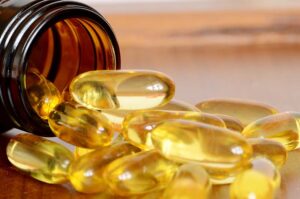When you’re not ingesting enough vitamin D with your food, supplements can help
By Deborah Jeanne Sergeant
In addition to your summertime tan, your vitamin D stores have long since disappeared.
While excessive sun is not so good for your skin, in moderation, it makes the body generate vitamin D, a pre-hormone that modulates many important bodily systems, including the immune system.
Why is D important?
“Vitamin D influences energy, depression and some research supports that it has a role in immunity as well,” said Rhianon Lester, registered nurse and registered dietitian with Rochester Regional Health Unity and RGH Bariatric Surgery. “If someone becomes depressed or feels under the weather, we would perform lab work to look at their vitamin D level.”
Vitamin D also helps the body absorb many of its nutrients.
Who needs more vitamin D?
Nearly everyone in Upstate New York. The sun is not intense enough from about October through May to trigger production of vitamin D. Lester said that older adults and people with darker skin tones are not as good as absorbing sunlight and synthesizing it for vitamin D.
Where can we get vitamin D?
Primarily, it’s through the UVB radiation in the sun. While too much exposure can cause skin cancer, 20 minutes’ cumulative exposure in a week suffices for generating vitamin D.
“Fatty fish like salmon, meats and fortified foods are also sources,” Lester said.
Commercially processed milk and other fortified products such as most boxed breakfast cereals contain vitamin D. Milk processed by an on-farm creamery may not have vitamin D added.
“Surprisingly, mushrooms have some vitamin D, but it’s not the most bioavailable,” Lester said.
How much D do we need?
As a fat-soluble nutrient, vitamin D is stored by the body if it gets too much.
“You can have too much of a good thing,” Lester said. “You don’t want a toxicity if you are supplementing. If you’re feeling depressed, tired this time of year, speak with your primary care provider and they can run lab work to find out if you are deficient. We’d look at how to bring it into your diet and we’d look at supplementation.”
Vitamin D generated through sunlight exposure does not cause toxicity.
Most people older than 70 need more vitamin D than younger people.
“After a certain age, you don’t absorb it as well,” said Marge Pickering-Piccone, health and nutrition coach and owner of Professional Health Services in Pittsford. “And few people spend enough time in the sun.”
The amount of vitamin D one needs varies depending no only on age but also other health concerns.
Pickering-Picone added that taking vitamin D3 supplements is better than vitamin D2, as the latter tends to calcify in the kidneys.
“D3 is essential for just about everybody in North America, as almost everyone is deficient,” she said.
Her last blood test revealed that her D3 level was “shockingly lower than what I expected,” she said. “The pandemic has kept me inside. So I can attribute that to part of it.”
She takes 5,000 IUs of vitamin D3 daily. Supplements may be taken at once and with or without food.
Pickering-Picone said that some health conditions may warrant more vitamin D3 than the standard recommended daily values, “such as those with autoimmune issues like MS or anything muscular,” she said. “A functional medicine doctor can give more guidance, but they’re not typically covered by insurance.”
So Why Do I Have Vitamin D Pills?
 Unfortunately, doctors do not prescribe a vacation to a sun-soaked island for their patients deficient in vitamin D. Instead, it’s a supplement providing 50,000 international units (IUs) of vitamin D per dose. Over-the-counter vitamin D provides at the most 10,000 IUs.
Unfortunately, doctors do not prescribe a vacation to a sun-soaked island for their patients deficient in vitamin D. Instead, it’s a supplement providing 50,000 international units (IUs) of vitamin D per dose. Over-the-counter vitamin D provides at the most 10,000 IUs.
Vitamin D helps the body absorb nutrients. Vitamin D deficiency can cause rickets in children and in adults, hypoparathyroidism, osteomalacia, hypocalcemia, or bone diseases, which is why a prescription is sometimes necessary.

